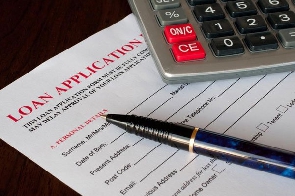Business News of Friday, 10 April 2020
Source: goldstreetbusiness.com
Banks, borrowers begin loan renegotiations
Following an official statement by the Ghana Association of Bankers on Monday, that its members – comprising all 23 universal banks licensed to operate in the country – are reducing their lending rates on both existing and imminent loans by 200 basis points (two percent) all the banks are already being inundated by enquiries from their indebted customers as to how this will work, coupled with requests for bilateral negotiations to restructure their outstanding loans.
In particular, most customers are requesting for restructuring of loan repayment schedules. Instructively, an earlier address to the nation by President Nana Akufo-Addo, in which the 200 basis point reduction in interest rates on loans was first mooted, also suggested a six month moratorium on loan repayments to the airline and hospitality industries which are clearly the worst hit sectors from the impact of the ongoing coronavirus pandemic. However while Monday’s statement from the GAB, signed by its CEO, Daniel Ato Kwamina Mensah, evidenced the banks’ acceptance of the President’s request for a two percent reduction in interest rates on loans, it was not forthcoming on the idea of a repayment moratorium, instead calling for bilateral negotiations between borrowers and their banks about restructuring their loan terms.
The two percent reduction in applicable interest rates applies to all outstanding loans and new ones being booked currently. The move effectively lowers the Ghana Reference Rate, which serves as the base lending rates for banks, to 13.12 percent, easily the lowest base lending rate since the GRR was first introduced in April 2018, at 16.10 percent. Since then, the rate, which is reviewed every month, has ranged between that introductory rate and a peak of 16.18 percent, reached in June last year. April’s rate of 15.12 percent, effective from the 1st of the month was already the lowest so far, even before this week’s announcement of a 200 basis points cut.
The GRR is computed using a model devised by the Bank of Ghana in close collaboration with GAB. However actually lending rates are higher, with each bank adding a spread over the GRR, computed from the perceived riskiness of each loan granted. But no matter the actual rate on each loan, they will all be subject to the announced two percent cut.
However, banking industry analysts already foresee several practical problems arising from the rate cut.
One relates to the length of the cut. GAB says that “the rate cut shall cover not only the period of the pandemic but banks recognize that it will take businesses and industries sometime after the end of the pandemic to retool and restock to achieve the semblance of normalcy – the cut will therefore cover the remaining term of the facilities.”
However some bankers are fretting that this means medium to long term loans will now attract lower than originally agreed interest income over several years to come even if the direct effects of the COVID 19 outbreak end much sooner. The situation could become much worse if deposit rates rise significantly, raising the spectre of interest income losses, rather than the interest income profits which are the biggest contributors to the overall profits of banks in Ghana.
The banks with the biggest dilemma will be those who proactively announced unilateral loan interest rate cuts over the past few weeks. An example is Fidelity Bank which, as early as March 26, announced a reduction in interest rates on its personal loans to 17.5 percent. The latest, industry wide cut would further lower rates on those loans to 15.5 percent, leaving the bank with little interest margin, if any at all.
The rate cut also will ensure that new loans will not be forthcoming except for banks most valued long term customers, who they will seek to retain at virtually any cost with the long term in mind. Already banks are reluctant to book new loans despite the monetary easing policy of the BoG because of the economic uncertainties inevitably generated by the coronavirus outbreak and consequent lock down which is applying brakes sharply on economic activity and business revenue generation not just in Ghana but worldwide as well.
Now the two percent rate cut is taking banks base rate (the GRR) below the coupon yields on all government cedi denominated domestic debt instruments, the lowest being the shortest yield 91 day treasury bills that still offer close to 14 percent per annum despite being completely riskless.
Warned one banker yesterday: “Banks are not going to take the credit risk of lending to customers when they can earn just as much, or even more, from investing in risk free government debt securities.”
Another area of uncertainty which the banking public want clearly resolved is that of deposit rates. GAB has not given any instruction to banks over whether to similarly lower deposit rates even as the run on deposits resulting from the COVID 19 instigated lock down has made competition among banks for customer deposits fiercer than ever before.
Again this means bilateral renegotiation, the snag being, as warned by GAB’s statement itself, will take time since the banks are currently operating with skeleton staff.













